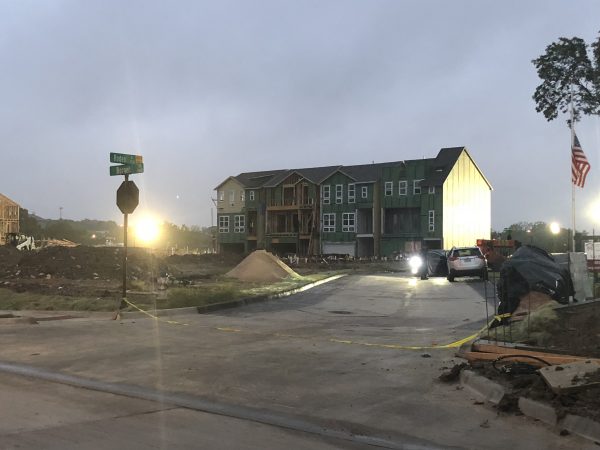
Dallas/Fort Worth has been setting records for rainfall. This week, another round of storms came through, prompting the governor to increase the State Operations Center’s level of readiness from Normal Conditions, to Increased Readiness.
“This is getting serious,” I can hear you murmuring to your computer screen.
It did get serious. A construction worker died when the storms moved through the Metroplex.
Loyal Scaiaholics will recall how much I do not enjoy shoving a microphone in people’s faces when they’re news story-adjacent, so I was absolutely looking forward to going out there and shoving a microphone in the face of people who had the unmitigated gall to leave the apartment complex across the street to walk their dog.
In fact, I had initially been sent to talk to construction workers. My editor had pulled me aside while I was leaving and told me to get some great audio. Up to that point, I was planning to get awful audio.
Her plan was thwarted, though, because no one showed up for work.
I pulled up next to one of the TV trucks. A reporter from one of the stations was also there doing “stand-ups.” I should add that he is not in any of the clips in that video.
Crime scene tape stretched across the street. A security guard was parked in front of the trailer.
The other reporter and I concocted a plan. The crime scene tape, you see, was actually just spread along the ground so cars could go in. I feel like the crime scene tape loses its authority in that situation.
“I’m going to go ask the security guard if it’s okay to come in,” I explained.
“Good idea. If it works, I’ll be right behind you,” he replied, encouragingly. “In the meantime, I’ll just stay back here.”
The security guard could not have been more pleasant, explaining that he’d turn away any workers who show up, and the contractor would fence off the area to start cleaning up.
So the TV reporter and I went to our back-up plan: shoving a microphone in the face of those workers who showed up to ask them if they feel ways about things.
Here’s how this works, gang: even though a reporter asks, we generally prefer to ask people who are actual newsmakers, not just random people who happened to wander into a natural disaster. So the reporters compare notes.
“That neighbor was nice,” we might tell each other, or “the guy in the gray sweatshirt. Go talk to him.”
In this case, the TV reporter talked to some people in a car but said they didn’t speak English well enough for an interview.
I stopped a guy who had pulled up, got out of his truck and started looking around. He was from a neighboring construction site and stopped to see what was happening.
“Sad case,” he said, quite concisely.
People did start coming out to walk their dogs eventually. At this point, though, we became the interview subjects because they’d ask what happened [a tenant asks].